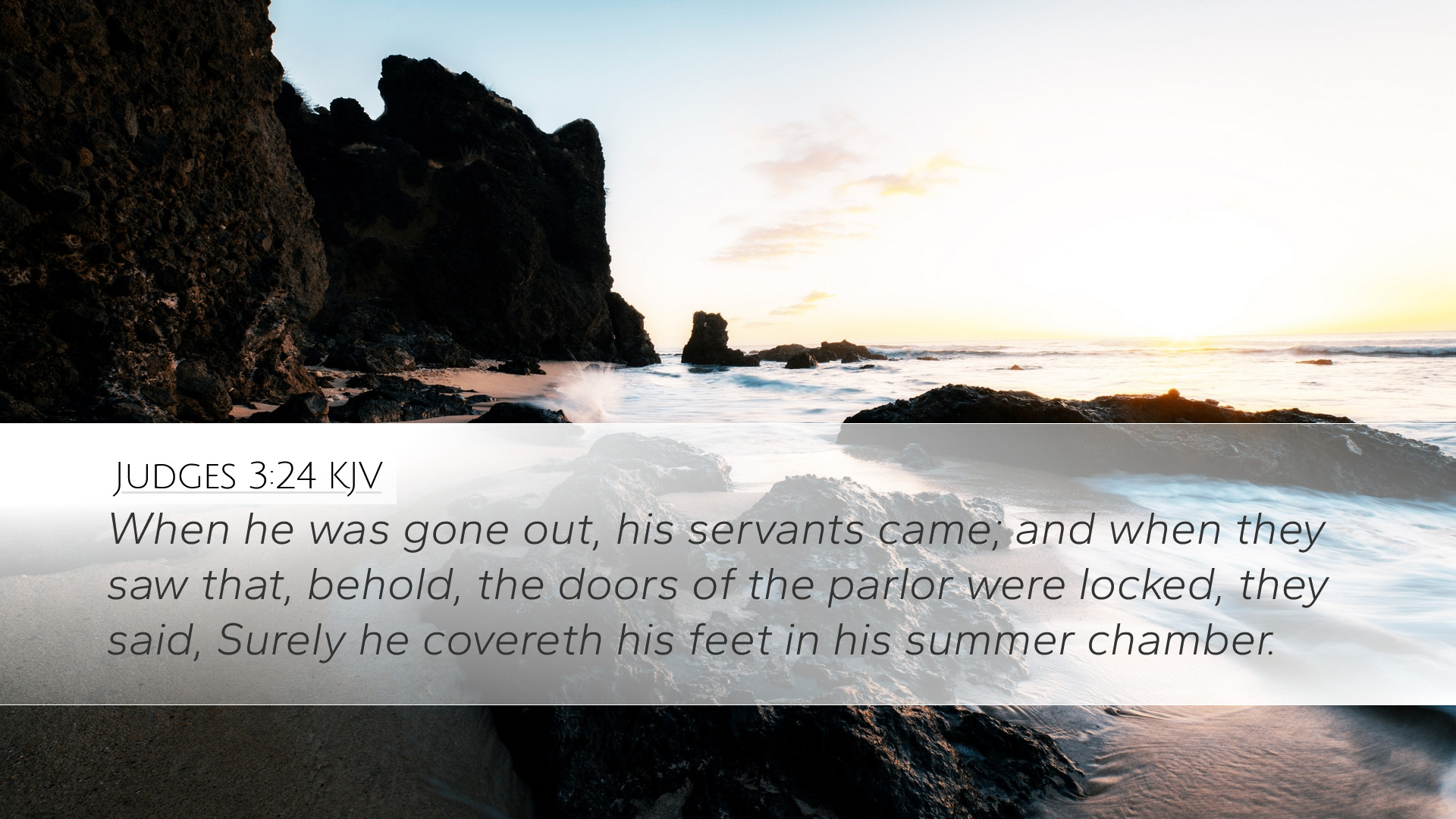Commentary on Judges 3:24
Judges 3:24 presents a pivotal moment in the narrative of the Book of Judges, encapsulating themes of divine justice, human courage, and the complexities of leadership in Israel's history. This verse, while brief, is rich in implication and serves as a critical point of reflection for pastors, students, theologians, and Bible scholars.
Text of Judges 3:24
“When he was gone, his servants came; and when they saw that, behold, the doors of the parlour were locked, they said, Surely he covereth his feet in his summer chamber.”
Contextual Analysis
This verse follows the dramatic assassination of Eglon, the king of Moab, by Ehud, a left-handed man from the tribe of Benjamin. To fully appreciate the implications of this event, it is vital to consider the historical and cultural context of Israel during this period, marked by cycles of apostasy, oppression, and deliverance.
- Historical Context: The Israelites had turned away from God, leading to their oppression by foreign powers. Eglon symbolized this oppression, ruling with cruelty over Israel.
- Cultural Context: The strategies employed by Ehud were not merely acts of valor but were deeply rooted in the customs and social dynamics of the time, including notions of bravery and treachery.
Commentary Insights
Matthew Henry's Commentary
Matthew Henry emphasizes the significance of providence in the events leading to Eglon’s assassination. He notes that God often uses unexpected instruments to deliver His people. Henry reflects on the character of Ehud, portraying him as a figure of cunning and determination, qualities that God can use to achieve His purposes. The “servants” of Eglon, in their ignorance of the true situation, represent the futility of human understanding apart from divine revelation.
Albert Barnes' Commentary
Albert Barnes delves into the practicality of Ehud's actions and the subsequent behavior of Eglon’s servants. He notes how they misinterpret the locked doors as a signal of Eglon's normalcy, symbolizing the blindness of the oppressors in the face of divine intervention. Barnes highlights the lessons in vigilance and discernment; those who serve leaders must be aware of the potential for significant changes occurring right under their noses.
Adam Clarke's Commentary
Adam Clarke provides a thorough examination of the phrase, "he covereth his feet," which he interprets as euphemistic language for Eglon’s vulnerability at that moment. Clarke suggests this was a culturally understood mannerism indicating the king was in a state of rest or perhaps even unprepared for any threats. He reflects on the military and political strategies employed by Ehud and frames the event within God's larger narrative of liberating Israel: a note of caution that those who pursue righteousness may employ unexpected means.
Theological Reflections
This passage invites theological reflection on several key points:
- Divine Sovereignty: God's hand is evident even in the seemingly chaotic and violent events of history. The events surrounding Ehud and Eglon remind us that God's plans surpass human understanding and actions.
- Human Agency: The actions of Ehud demonstrate that God empowers those willing to act on His behalf, reinforcing the belief in the necessity of human courage in the face of injustice.
- The Nature of Leadership: The difference between good and evil leadership is starkly portrayed. Eglon, as a tyrant, represents oppression, while Ehud’s actions, though violent, seem justified in the pursuit of freedom for the oppressed Israelites.
Application for Today
For modern believers, Judges 3:24 serves as both a warning and an encouragement. It calls leaders to be vigilant and discerning, recognizing that oppression can often go unnoticed until it is too late. At the same time, it emboldens those who fight against injustice through faith and action, reminding them that even when the odds seem insurmountable, God can work through unlikely means to bring about change.
Conclusion
In conclusion, Judges 3:24 encapsulates a moment rich with meaning and significance. As we reflect on this passage in light of the commentaries by Matthew Henry, Albert Barnes, and Adam Clarke, we are reminded of the intricate ways in which God operates throughout human history. This verse not only illuminates the historical context of Israel’s deliverance but also challenges us to remain aware, engage actively in our contexts, and trust in the sovereignty of God amidst turmoil.


